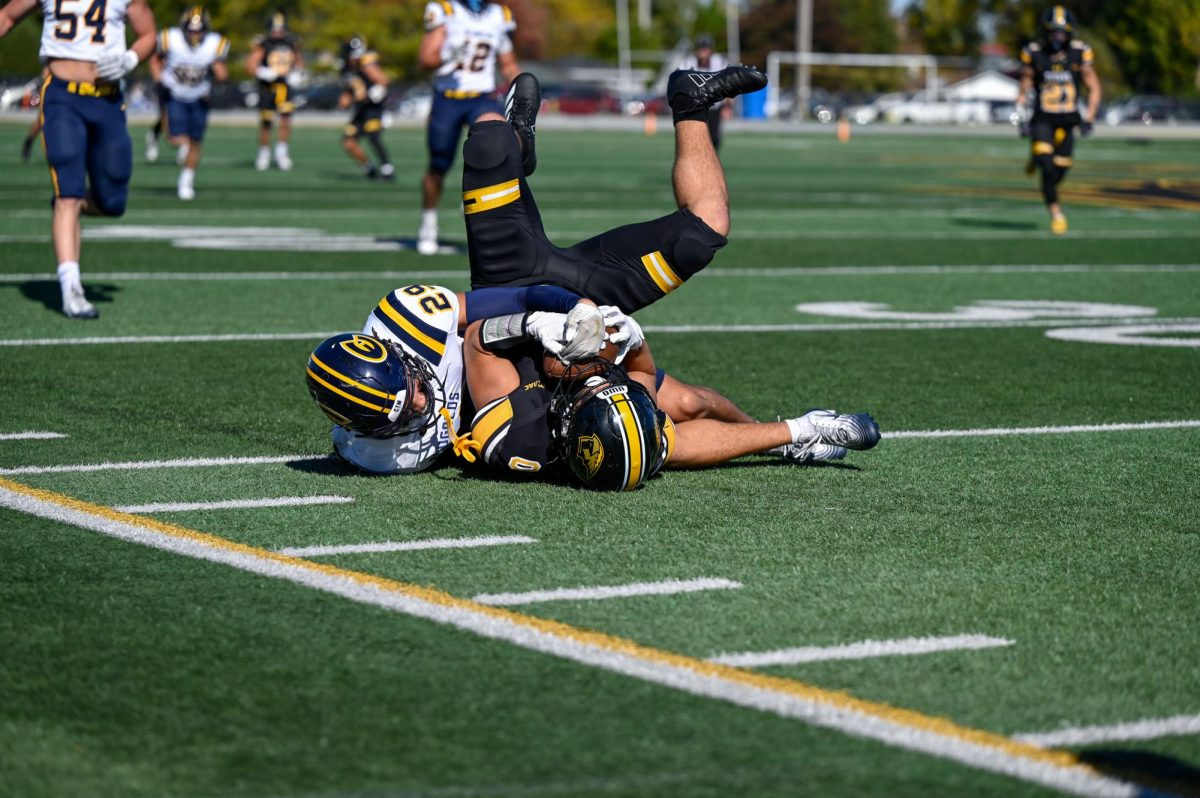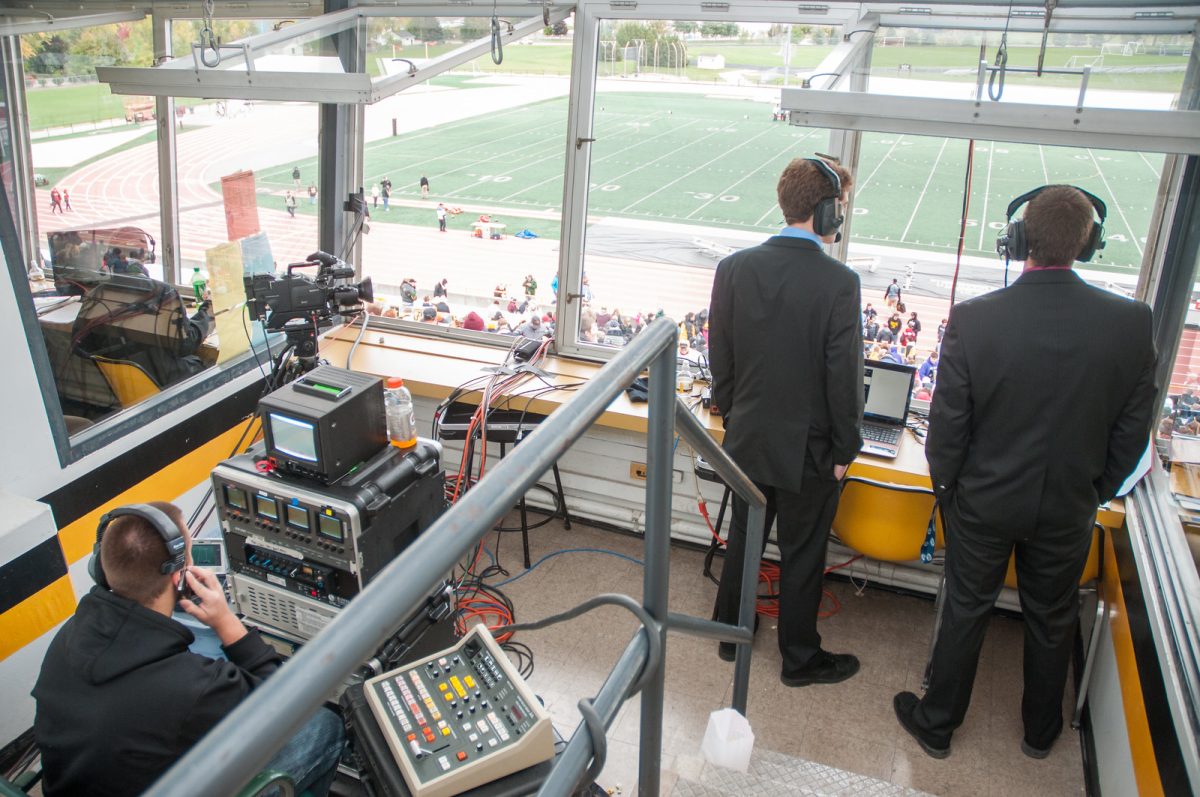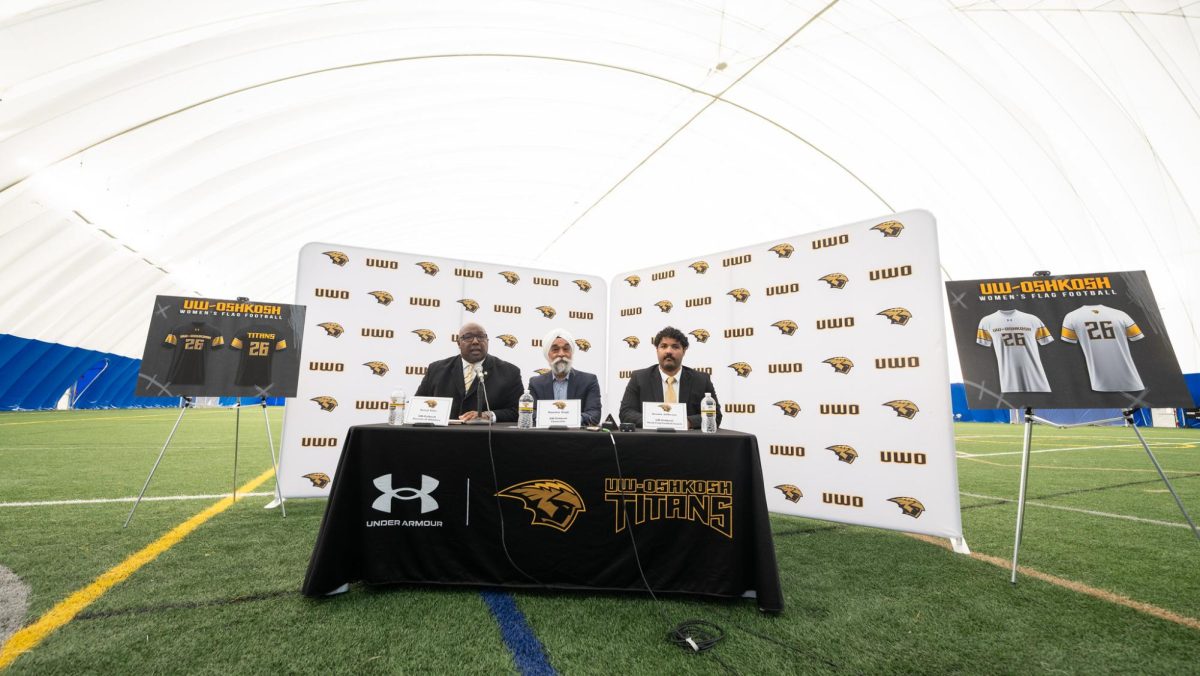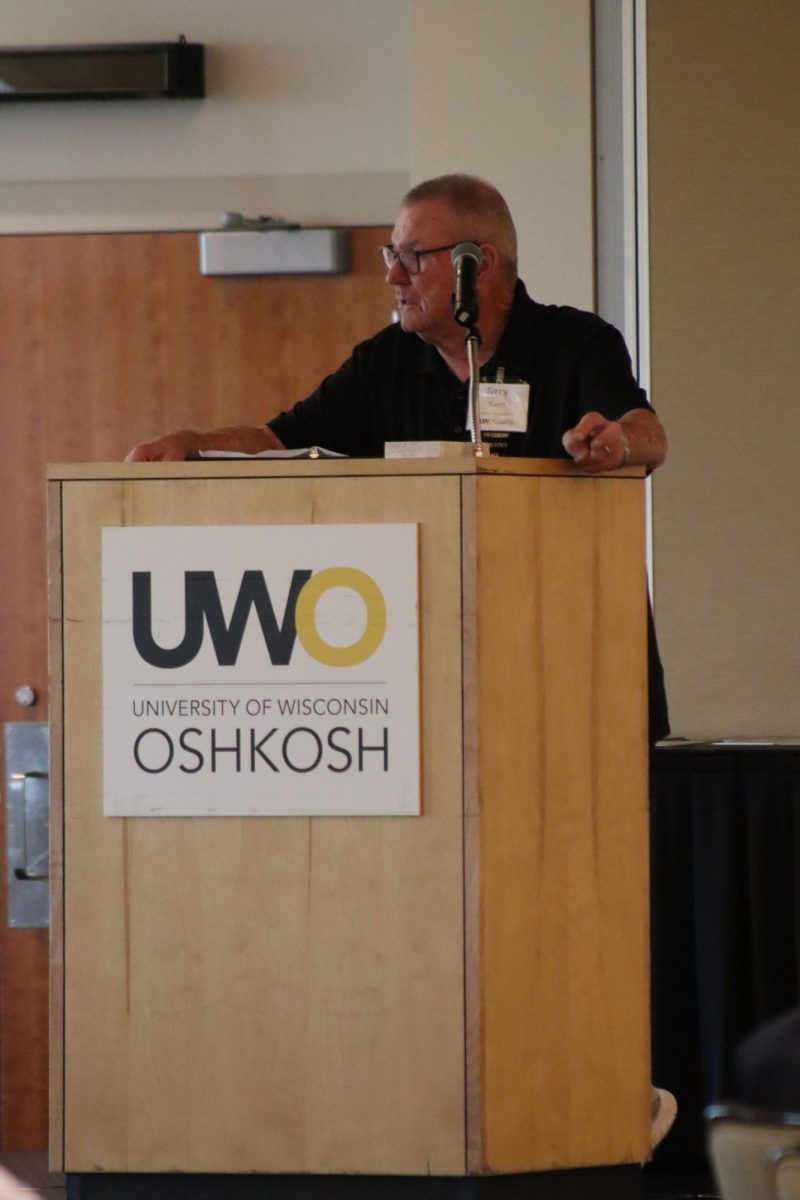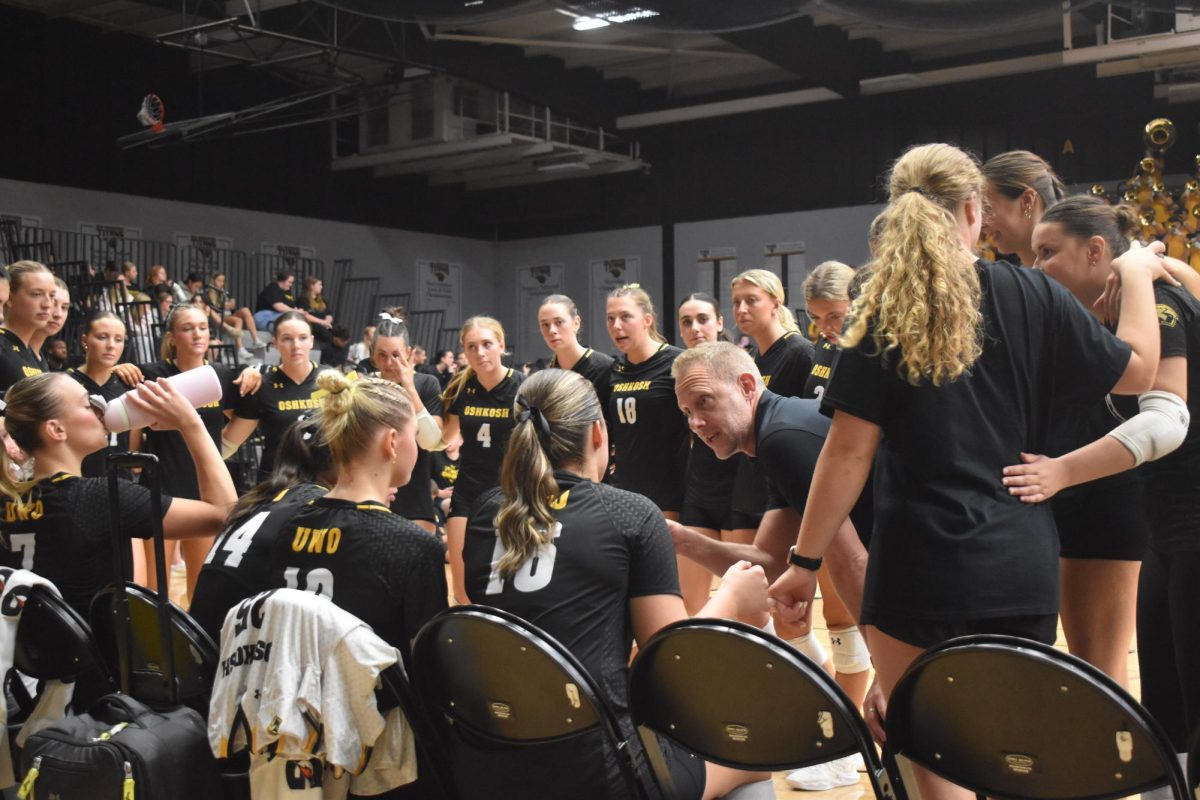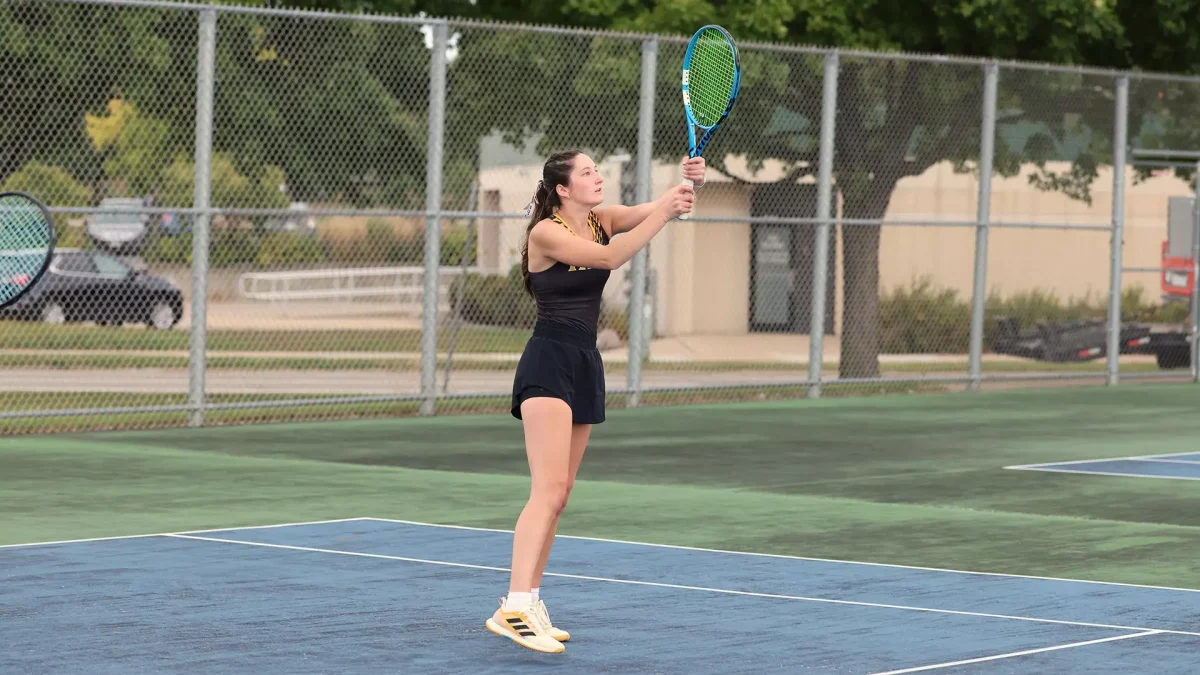Balancing school, athletics and a job can be a stressful task for student-athletes. Behind the scenes and helping with this stress are assistant coaches. They don’t get all the glitz and glamour a head coach might get, but they are just as instrumental to the team and students’ success.
How assistant coaches arrive at UWO
Assistant coaches at UWO have taken many different paths to get where they are today. From being a student assistant to coaching a successful high school program and making the transfer to college coaching, there are coaches with a variety of backgrounds on campus.
Assistant coach Laura Stair helps oversee women’s golf on campus and was a player for three years at UW Oshkosh. Stair is in her first year as an assistant and was golfing on the team just last year. Currently majoring in elementary education at Oshkosh, Stair knows all too well the stress of being a student-athlete.
“Being so close in age to the players on the team has been a challenge but has its benefits as well,” Stair said. “Being a young coach has definitely been a learning experience. It’s been a battle of finding that happy medium of being a friend and a coach since I had previously played with over half of the girls.”
Stair also feels like she can relate to the student-athletes on a personal level, which helps strengthen the team dynamic.
“I feel as though some of the girls are more comfortable talking to me about things or reach out whenever they need to talk,” Stair said. “They know I’ve been there and are always able to come to me with any questions they may have.”
On the other side of the court is the assistant men’s basketball coach, Matt Lewis. Lewis has been coaching Titan basketball for six years and has experience with Tulane University, Cornell College, and Rhodes College working in and around their basketball programs.
The experience Lewis has gained from fellow coaches at other programs and coaches from his playing days at Cornell College has taught him many things he can share with UWO players.
“Having multiple experiences, you tend to take something away from each experience, whether it’s a defensive scheme, an offensive scheme or just ways to run a program,” Lewis said. “Maybe you learned something you didn’t like and you can apply that going forward too.”
Assistant women’s basketball coach Kelly McNiff also has coaching experience before arriving at UWO. McNiff coached De Pere High School to a Division I Wisconsin Interscholastic Athletic Association state championship in 2012 and compiled an overall record of 96-11 while coaching the school from 2010-2013. McNiff also had coaching stints with Green Bay Southwest High School, Oshkosh North High School and UW-Green Bay coaching either basketball, softball or both.
Now, in her third year assisting at UW Oshkosh, McNiff developed a love for coaching while playing for UWO from 1997-2000.
“Coaching is my true passion,” McNiff said. “I’ve always liked that side of the game. But I truly developed a love for coaching my junior year of college. I missed most of that season with a couple of knee injuries.”
McNiff added her former coaches taught her some of the ins and outs of coaching while she recovered from her knee injury.
“My coaches, former Titans head coach Pam Ruder and assistant coach Kris Schoonover, were intense, knowledgeable and passionate about every aspect – X’s and O’s, players, attention to detail, etc.,” McNiff said. “I possibly learned more from them during that season that any of my other seasons here and from that point on, I knew coaching would be a part of my future.”
Academics are just as important as athletics
Another important part of a coach’s job description is the academic assistance they provide players. Stair and head women’s golf coach Liza Ruetten keep a close eye on how golfers are doing in classes.
“We have academic meetings with our girls twice a week just to check in and make sure all is well,” Stair said. “We use this time to catch up, hear how their college experience is going and allow for conversation and catching up since we aren’t seeing them every day anymore. Our team has a very good balance between school and athletics, and they know both coach Ruetten and I understand and are willing to work with their schedules if something was to come up.”
McNiff understands academics are equally as important as athletics for student-athletes.
“We take a lot of pride in the success of our players both on the court and in the classroom,” McNiff said. “At the beginning of each semester, we give each player an academic binder. This is used to keep track of semester projects, exams and daily assignments.”
McNiff described the relationship of player and professor as ideally, a very personal one.
“Players get a signature from each of their professors every other week,” McNiff said. “This provides our players guaranteed ‘face time’ with their professor and doesn’t allow them to just be a body in a seat.”
McNiff said players then meet with coaches to ensure they are organized and confident in their studies. Subjects they discuss include what classes the student may be struggling in, upcoming exams or projects and/or what classes they enjoy.
“On weeks that players get signatures, they also meet with [head] coach [Brad] Fischer or myself,” McNiff said. “We have a 15 minute meeting to discuss each class.”
The men’s basketball team has set a 3.2 GPA standard, which is far above the required 2.0 GPA the WIAC requires. Some players need help or more time to spend on their classes, which is where coaches can help them out.
Coach Lewis said he tried to set a good example for players to get on the right path academically.
“The first thing to do is class,” Lewis said. “So if we have guys that have conflicts, whether they have a class that runs into practice time or they need to leave early, that’s always the first priority.”
Practice makes perfect
Keeping practices fun and interesting can be a difficult task for coaches. Assistant coaches are vital to coming up with new ideas to keep players engaged. Usually having worked with many other coaches, assistant coaches can borrow ideas from past coaches they have worked with.
McNiff said she can implement information from clinics and other coaches to contribute to practices.
“As in most things, there is no reason to try to ‘reinvent the wheel,’” McNiff said. “I think coaches do a great job of learning and borrowing from one another. Coach Fischer and I often attend coaching clinics to see what others are doing. We can take a few of these ideas and use them or tweak them to fit our style and needs.”
Assistant baseball coach Mike Pierce is a young coach who is his second year at Oshkosh. Pierce played at UW-Whitewater from 2013-15, so he played against some of the players that he is coaching now.
Pierce believes it is important to individualize practices while also working on team aspects.
“We do team work on skills and then we will also break down practices to work on their individual areas that need to be improved,” Pierce said. “We have our core drills that we do and then we incorporate other drills that meet each of our players’ specific needs.”
During the dog days of a baseball season, Pierce said practices can get repetitive if coaches aren’t finding new things to work on.
“Our guys are constantly learning and perfecting their game,” Pierce said. “Even me as a coach, I’m always trying to learn new things. We spend quite a bit of time diving into the numbers and analyzing what we could be doing better as a team and individually.”
Lewis said practice formatting can change as the year goes on.
“Typically, as the year goes, our practices will get shorter,” Lewis said. “We try and focus more on film and have more time off the floor so we’re not banging bodies a lot.”
Assistant coaches, especially at the D-III level, have much more on their plate than meets the eye. Due to the fact D-III colleges don’t have the resources bigger schools may have, assistant coaches and coaches in general have to do some of the “dirty work” that may be conducted by an assistant at a higher level.
Lewis said even with the staff size that he is on, everything works itself out.
“This morning I’m printing posters, doing laundry and we’re doing film,” Lewis said. “We’re just asked to plug a lot of holes just because our staff isn’t very big.”
UWO assistant softball coach Lynn Anderson described some of the ways assistant coaches can help with the behind the scenes details.
“Usually assistant coaches take care of the following areas: booking hotel rooms, reserving vehicles, preparing travel itineraries, purchasing team food, filling out travel forms, preparing scouting reports, coordinating community service options, doing team laundry and organizing study tables,” Anderson said.
The importance of assistant coaches goes beyond what people see on the court, field or course. They have many hidden duties that help keep student-athletes focused in the classroom as well as on the court or field.



